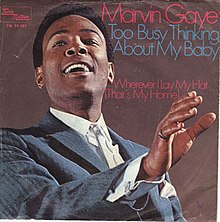| "Too Busy Thinking About My Baby" | ||||
|---|---|---|---|---|
 | ||||
| Single by Marvin Gaye | ||||
| from the album M.P.G. | ||||
| B-side | "Wherever I Lay My Hat (That's My Home)" | |||
| Released | April 2, 1969 | |||
| Recorded | Hitsville USA (Studio A); 1969 | |||
| Genre | ||||
| Length | 2:55 | |||
| Label | Tamla T 54181 | |||
| Songwriter(s) | ||||
| Producer(s) | Norman Whitfield | |||
| Marvin Gaye singles chronology | ||||
| ||||
| Audio video | ||||
| "Too Busy Thinking About My Baby" on YouTube | ||||
"Too Busy Thinking About My Baby" is a Motown song written by Norman Whitfield, Barrett Strong, and Janie Bradford. The song was first recorded by The Temptations as a track on their 1966 album Gettin' Ready. Eddie Kendricks sings lead on the recording, which was produced by Whitfield. Jimmy Ruffin also recorded a version with The Temptations providing background vocals in 1966. It remained unreleased until 1997.
Three years later, Motown artist Marvin Gaye recorded a cover version of "Too Busy Thinking About My Baby" as a follow-up single to his 1968 hit "I Heard It Through the Grapevine", another Whitfield/Strong composition, which was a trans-atlantic top five hit. Whitfield produced Gaye's version as well, which featured background vocals by The Andantes. The song's lyrics feature the male narrator discussing how he has "no time to discuss weather" or "think about what money can buy", because when he thinks about his woman, "I ain't got time for nothing else".
In terms of chart success, "Too Busy Thinking About My Baby" was Gaye's second biggest hit of the 1960s, after "I Heard It Through the Grapevine". "Too Busy Thinking About My Baby" peaked at No.4 on the Billboard Hot 100 in the United States, and remained at the No.1 position on Billboard's Black Singles Chart for six consecutive weeks, from the weeks of, June 7 until July 12, 1969,[3] with sales close to two million records. The single was the top-selling R&B single of the year,[4] and also reached No.14 on Billboard’s year-end charts. The tune was the first release from Gaye's 1969 studio album M.P.G.. The single also reached No.5 in the UK Singles Chart.
Cash Box described it as a "medium paced rock effort" with a "solid vocal" and "a phenomenal production using tom-tom effectiveness to stoke up dance fan fires."[1]
- ^ a b "CashBox Record Reviews" (PDF). Cash Box. April 19, 1969. p. 22. Retrieved 2021-12-08.
- ^ Marsh, Dave (1989). The Heart of Rock & Soul: The 1001 Greatest Singles Ever Made. Plume. p. 427. ISBN 0-452-26305-0.
- ^ Whitburn, Joel (2004). Top R&B/Hip-Hop Singles: 1942–2004. Record Research. p. 225.
- ^ Whitburn, Joel (2004). Top R&B/Hip-Hop Singles: 1942–2004. Record Research. p. 804.